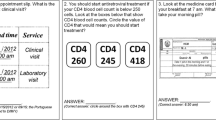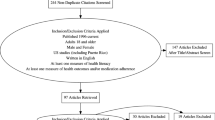Abstract
A brief, 8-item assessment of HIV treatment knowledge and action was developed and evaluated. Patients with HIV were interviewed in 2001 at infectious disease clinics in Shreveport, LA and Chicago, IL. Analyses on demographics, self-reported medication adherence, and responses to the Rapid Estimate of Adult Literacy in Medicine (REALM) and new, Brief Estimate of Health Knowledge and Action—HIV version (BEHKA-HIV) were performed in 2007. The BEHKA-HIV demonstrated high internal consistency, and construct validity. Lower scores on the BEHKA-HIV were independently associated with poorer rates of HIV medication adherence, scores 4–5 out of 8, AOR 2.6 (95% CI 1.9–3.6), and scores 0–3, AOR 11.4 (95% CI 8.2–15.9), as were the lowest scores on the REALM, AOR 3.3 (95% CI 1.3–8.7). The BEHKA-HIV is a psychometrically sound tool for assessing health knowledge and action regarding HIV treatment, and predicting non-adherence to HIV medications.
Similar content being viewed by others
References
Baker, D. W., Williams, M. V., Parker, R. M., Gazmararian, J. A., & Nurss, J. (1999). Development of a brief test to measure functional health literacy. Patient Education and Counseling, 38(1), 33–42. doi:10.1016/S0738-3991(98)00116-5.
Baker, D. W., Wolf, M. S., Feinglass, J., Thompson, J. A., Gazmararian, J. A., & Huang, J. (2007). Health literacy and mortality among elderly persons. Archives of Internal Medicine, 167(14), 1503–1509. doi:10.1001/archinte.167.14.1503.
Davis, T. C., Long, S. W., Jackson, R. H., Mayeaux, E. J., George, R. B., Murphy, P. W., et al. (1993). Rapid estimate of adult literacy in medicine: A shortened screening instrument. Family Medicine, 25(6), 391–395.
Davis, T. C., Michielutte, R., Askov, E. N., Williams, M. V., & Weiss, B. D. (1998). Practical assessment of adult literacy in health care. Health Education & Behavior, 25(5), 613–624. doi:10.1177/109019819802500508.
Davis, T. C., & Wolf, M. S. (2004). Health literacy: Implications for family medicine. Family Medicine, 36(8), 595–598.
Davis, T. C., Wolf, M. S., Bass, P. F., 3rd, Middlebrooks, M., Kennen, E., Baker, D. W., et al. (2006). Low literacy impairs comprehension of prescription drug warning labels. Journal of General Internal Medicine, 21(8), 847–851. doi:10.1111/j.1525-1497.2006.00529.x.
DeMasi, R. A., Graham, N. M., Tolson, J. M., Pham, S. V., Capuano, G. A., Fisher, R. L., et al. (2001). Correlation between self-reported adherence to highly active antiretroviral therapy (HAART) and virologic outcome. Advances in Therapy, 18(4), 163–173. doi:10.1007/BF02850110.
DeMasi, R. A., Tolson, J. M., Pham, S. V., Capuano, G. A., & Fisher, R. L. (1999). Self-reported adherence to HAART and correlation with HIV RNA: Initial results with the patient medication adherence questionnaire. Paper presented at the 6th Conference on Retroviruses and Opportunistic Infections, Chicago, Illinois.
Gazmararian, J. A., Baker, D. W., Williams, M. V., Parker, R. M., Scott, T. L., Green, D. C., et al. (1999). Health literacy among Medicare enrollees in a managed care organization. Journal of the American Medical Association, 281(6), 545–551. doi:10.1001/jama.281.6.545.
Georges, C. A., Bolton, L. B., & Bennett, C. (2004). Functional health literacy: An issue in African-American and other ethnic and racial communities. Journal of National Black Nurses’ Association, 15(1), 1–4.
Gong, D. A., Lee, J. Y., Rozier, R. G., Pahel, B. T., Richman, J. A., & Vann, W. F., Jr. (2007). Development and testing of the Test of Functional Health Literacy in Dentistry (TOFHLiD). Journal of Public Health Dentistry, 67(2), 105–112. doi:10.1111/j.1752-7325.2007.00023.x.
IOM. (2004). Health literacy: A prescription to end confusion. Washington, D.C: National Academies Press.
Kalichman, S. C., Benotsch, E., Suarez, T., Catz, S., Miller, J., & Rompa, D. (2000). Health literacy and health-related knowledge among persons living with HIV/AIDS. American Journal of Preventive Medicine, 18(4), 325–331. doi:10.1016/S0749-3797(00)00121-5.
Kalichman, S. C., Cherry, J., & Cain, D. (2005). Nurse-delivered antiretroviral treatment adherence intervention for people with low literacy skills and living with HIV/AIDS. The Journal of the Association of Nurses in AIDS Care, 16(5), 3–15. doi:10.1016/j.jana.2005.07.001.
Kalichman, S. C., Ramachandran, B., & Catz, S. (1999). Adherence to combination antiretroviral therapies in HIV patients of low health literacy. Journal of General Internal Medicine, 14(5), 267–273. doi:10.1046/j.1525-1497.1999.00334.x.
Lee, J. Y., Rozier, R. G., Lee, S. Y., Bender, D., & Ruiz, R. E. (2007). Development of a word recognition instrument to test health literacy in dentistry: The REALD-30—a brief communication. Journal of Public Health Dentistry, 67(2), 94–98. doi:10.1111/j.1752-7325.2007.00021.x.
Miller, L. G., Liu, H., Hays, R. D., Golin, C. E., Ye, Z., Beck, C. K., et al. (2003). Knowledge of antiretroviral regimen dosing and adherence: A longitudinal study. Clinical Infectious Diseases, 36(4), 514–518. doi:10.1086/367857.
Osborn, C. Y., Paasche-Orlow, M. K., Davis, T. C., & Wolf, M. S. (2007). Health literacy: An overlooked factor in understanding HIV health disparities. American Journal of Preventive Medicine, 33(5), 374–378. doi:10.1016/j.amepre.2007.07.022.
Parker, R. M., Baker, D. W., Williams, M. V., & Nurss, J. R. (1995). The test of functional health literacy in adults: A new instrument for measuring patients’ literacy skills. Journal of General Internal Medicine, 10(10), 537–541. doi:10.1007/BF02640361.
Richman, J. A., Lee, J. Y., Rozier, R. G., Gong, D. A., Pahel, B. T., & Vann, W. F., Jr. (2007). Evaluation of a word recognition instrument to test health literacy in dentistry: The REALD-99. Journal of Public Health Dentistry, 67(2), 99–104. doi:10.1111/j.1752-7325.2007.00022.x.
Smith, D. R. (1998). The Lexile Scale in theory and practice. Final Report. MetaMetrics, Inc: Washington, D.C.
Sudore, R. L., Mehta, K. M., Simonsick, E. M., Harris, T. B., Newman, A. B., Satterfield, S., et al. (2006). Limited literacy in older people and disparities in health and healthcare access. Journal of the American Geriatrics Society, 54(5), 770–776. doi:10.1111/j.1532-5415.2006.00691.x.
Weiss, B. D., Mays, M. Z., Martz, W., Castro, K. M., DeWalt, D. A., Pignone, M. P., et al. (2005). Quick assessment of literacy in primary care: The newest vital sign. Annals of Family Medicine, 3(6), 514–522. doi:10.1370/afm.405.
Wolf, M. S., Davis, T. C., Arozullah, A., Penn, R., Arnold, C., Sugar, M., et al. (2005a). Relation between literacy and HIV treatment knowledge among patients on HAART regimens. AIDS Care, 17(7), 863–873.
Wolf, M. S., Davis, T. C., Osborn, C. Y., Skripkauskas, S., Bennett, C. L., & Makoul, G. (2007). Literacy, self-efficacy, and HIV medication adherence. Patient Education and Counseling, 65(2), 253–260. doi:10.1016/j.pec.2006.08.006.
Wolf, M. S., Davis, T. C., Tilson, H. H., Bass, P. F., 3rd, & Parker, R. M. (2006). Misunderstanding of prescription drug warning labels among patients with low literacy. American Journal of Health-System Pharmacy, 63(11), 1048–1055. doi:10.2146/ajhp050469.
Wolf, M. S., Gazmararian, J. A., & Baker, D. W. (2005b). Health literacy and functional health status among older adults. Archives of Internal Medicine, 165(17), 1946–1952. doi:10.1001/archinte.165.17.1946.
Acknowledgments
Dr. Osborn conducted this research as a National Research Service Award postdoctoral fellow at the Institute for Healthcare Studies, Feinberg School of Medicine at Northwestern University, under an institutional award from the Agency for Health care Research and Quality (T32 HS000078-09). Dr. Wolf supported this research with a Career Development Award through the Centers for Disease Control and Prevention (K01 EH000067-01).
Author information
Authors and Affiliations
Corresponding author
Rights and permissions
About this article
Cite this article
Osborn, C.Y., Davis, T.C., Bailey, S.C. et al. Health Literacy in the Context of HIV Treatment: Introducing the Brief Estimate of Health Knowledge and Action (BEHKA)—HIV Version. AIDS Behav 14, 181–188 (2010). https://doi.org/10.1007/s10461-008-9484-z
Received:
Accepted:
Published:
Issue Date:
DOI: https://doi.org/10.1007/s10461-008-9484-z




